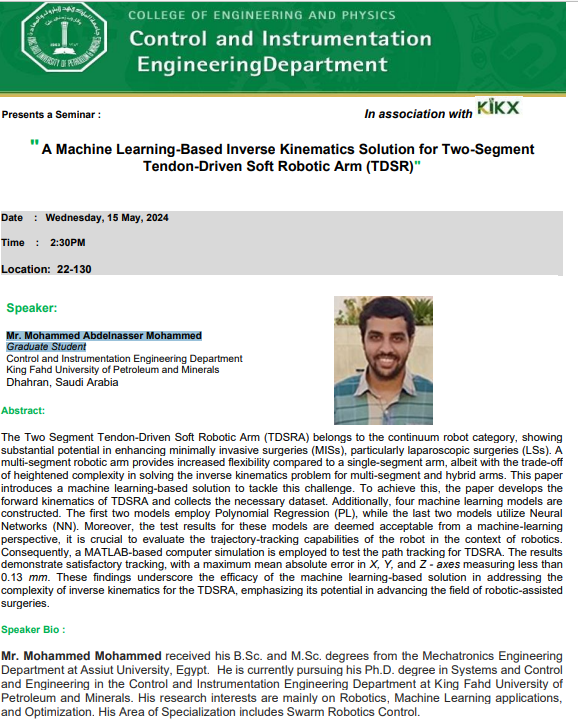
Seminar on "A Machine Learning-Based Inverse Kinematics Solution for Two-Segment Tendon-Driven Soft Robotic Arm (TDSR)" by Mr. Mohammed Abdelnasser Mohammed, Graduate Student of CIE Dept
-
Bld. 22 Room 130
-
May 15, 2024 - May 15, 2024
-
2:30 p.m. - 3 p.m.
Speaker:
Mr. Mohammed Abdelnasser Mohammed
Graduate Student
Control and Instrumentation Engineering Department
King Fahd University of Petroleum and Minerals
Dhahran, Saudi Arabia
Abstract:
The Two Segment Tendon-Driven Soft Robotic Arm (TDSRA) belongs to the continuum robot category, showing substantial potential in enhancing minimally invasive surgeries (MISs), particularly laparoscopic surgeries (LSs). A multi-segment robotic arm provides increased flexibility compared to a single-segment arm, albeit with the trade-off of heightened complexity in solving the inverse kinematics problem for multi-segment and hybrid arms. This paper introduces a machine learning-based solution to tackle this challenge. To achieve this, the paper develops the forward kinematics of TDSRA and collects the necessary dataset. Additionally, four machine learning models are constructed. The first two models employ Polynomial Regression (PL), while the last two models utilize Neural Networks (NN). Moreover, the test results for these models are deemed acceptable from a machine-learning perspective, it is crucial to evaluate the trajectory-tracking capabilities of the robot in the context of robotics. Consequently, a MATLAB-based computer simulation is employed to test the path tracking for TDSRA. The results demonstrate satisfactory tracking, with a maximum mean absolute error in X, Y, and Z - axes measuring less than 0.13 mm. These findings underscore the efficacy of the machine learning-based solution in addressing the complexity of inverse kinematics for the TDSRA, emphasizing its potential in advancing the field of robotic-assisted surgeries.
Speaker Bio :
Mr. Mohammed Mohammed received his B.Sc. and M.Sc. degrees from the Mechatronics Engineering Department at Assiut University, Egypt. He is currently pursuing his Ph.D. degree in Systems and Control and Engineering in the Control and Instrumentation Engineering Department at King Fahd University of Petroleum and Minerals. His research interests are mainly on Robotics, Machine Learning applications, and Optimization. His Area of Specialization includes Swarm Robotics Control. All faculty, researchers, and graduate students